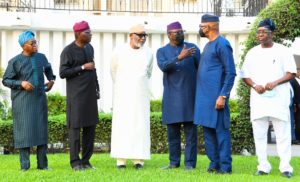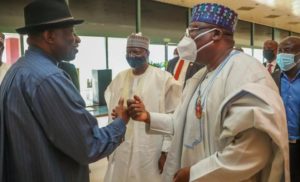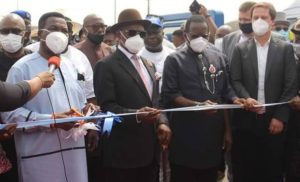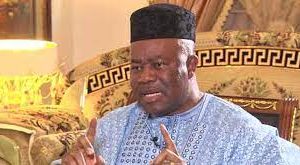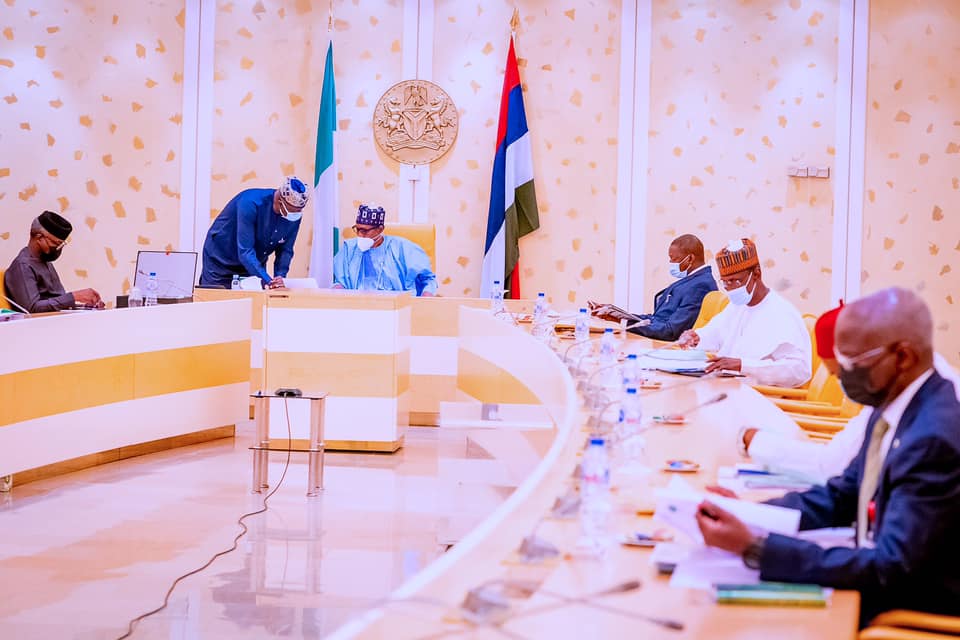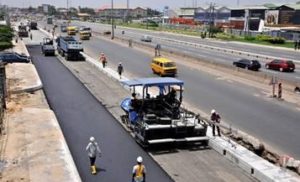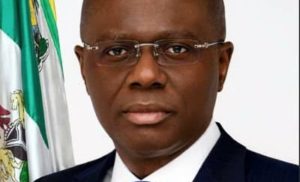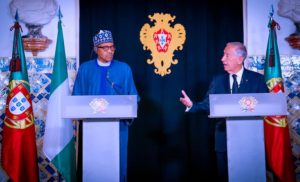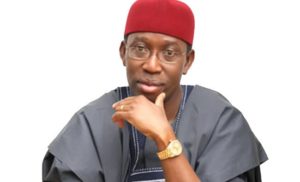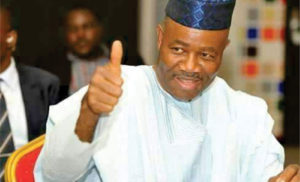WHAT PRESIDENT BUHARI SAID (DIDN’T SAY) IN IMO STATE
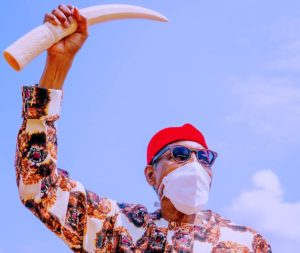 PRESIDENT BUHARI EXTOLS ETSU NUPE YAHAYA ABUBAKAR AT 69, PRAISES THE REIGN OF PEACE UNDER HIM
PRESIDENT BUHARI EXTOLS ETSU NUPE YAHAYA ABUBAKAR AT 69, PRAISES THE REIGN OF PEACE UNDER HIM
President Muhammadu Buhari has extolled the virtues of the Etsu Nupe Yahaya Abubakar on the occasion of his 69th birthday and 18th anniversary on the throne, describing him “as a remarkable traditional ruler.”
President Buhari, in a goodwill message on Sunday, noted that during Abubakar’s reign, “peace and harmony have thrived in his domain”, adding that “the Etsu Nupe has used his military background and experience to work assiduously for the promotion of peace, harmony and unity amongst his people.”
“Since your appointment 18 years ago to succeed Sanda Ndayako, you have proved yourself worthy of the appointment and, as a retired army general myself, I am proud of your accomplishments on the throne so far,” the President said.
According to President Buhari, “the Etsu Nupe is a humble traditional ruler who has devoted his time and efforts to the promotion of the welfare and progress of his people.”
He explained that “traditional rulers are closest to the people and play critical roles in the promotion of peace and harmony in the country.”
While congratulating Etsu Yahaya Abubakar on the doubly important occasion, the President advised him “not to rest on his oars and continue to offer his fatherly advice to leaders at all levels in order to move Nigeria forward.”
Garba Shehu
Senior Special Assistant to the President
(Media & Publicity)
September 12, 2021
WHAT PRESIDENT BUHARI SAID (DIDN’T SAY) IN IMO  STATE
STATE
We have observed that President Buhari’s concluding remarks at the meeting with South East Leaders during his one day visit to Imo State is being deliberately contorted and twisted out of context.
The purveyors of disinformation want Nigerians to believe that the President bluntly told Governor Uzodinma, ‘‘I’ll be careful with your future invitations.’’
They have adduced different meanings to the phrase, contrary to the context wherein the President spoke during his successful dialogue with leaders of thought from Igbo land.
When he arrived at the banquet hall of Imo State Government House for his last assignment in Owerri, the President was welcomed by over 50 leaders from the South East who had waited patiently for him for a Town Hall engagement, after commissioning strategic projects in the State.
The President began his extempore speech by acknowledging the caliber of personalities present at the dialogue including the President-General of Ohaneze Ndigbo, Prof George Obiozor, former Chief of General Staff, Commodore Ebitu Ukiwe (Rtd), former Senate President Ken Nnamani, former Military Governor in old Imo State, Senator Ike Nwachukwu, the Obi of Onitsha, Igwe Alfred Achebe, Chairman of the South East Governors Forum and Governor of Ebonyi State, Dave Umahi, Deputy Governors of Abia, Anambra and the SSG of Enugu State, who represented the Governor, the Anglican Archbishop of Owerri Province, Most Rev David Onouha and his brother Bishop of Enugu, Archbishop Emmanuel Chukwuma, Chief Emmanuel Iwuanyanwu, Ahaejiagamba Ndigbo, just to mention but a few.
An elated President Buhari made it clear that he was expressly overwhelmed by the reception and galaxy of personalities that travelled from the five South Eastern States to have a heart-to-heart discussion with him in Owerri, the Imo State capital.
His words were clear:
‘‘I am overwhelmed by this reception, overwhelmed in the sense that when I accepted the invitation by the Imo State Governor, who wants to justify investments the government has done to the people of Imo State, I thought I would see the bridges, the roads and a few renovations.
‘‘He didn’t tell me he was going to get the whole Igbo leadership here. So in the future when he invites me, I’ll know what to do. But I think he has done what the military didn’t like. He has achieved surprise. He has surprised me beyond description.’’
Later, in his concluding statement at the same event, the President made reference to his earlier remarks on the ‘‘surprise’’ action pulled by the Governor. On a lighter note, he quipped:
‘‘Governor of Imo State, I cannot thank you enough, but I will be careful with your future invitations.’’
The President’s historic visit to Imo State was very successful and the Igbo leaders who met him shared the same enthusiasm that his coming to the Eastern heartland would bring peace, foster unity, encourage good and better understanding among the citizenry.
Archbishop David Onuoha, who is the Anglican Archbishop of Owerri Ecclesiastical Province, must have summed up the mood in the words of the prayer offered at the event:
‘‘Thank You dear Lord for our nation Nigeria and her people with diverse backgrounds, nationalities and cultures. Surely You did not make any mistakes in bringing us together.
‘‘Your purpose is for us to harness our potentials/strength to build a strong and virile nation. May this purpose never be defeated.
‘‘Glory be unto You for bringing Your servant and our dear President, His Excellency Muhammadu Buhari, safely to this State. Blessed be Your name for his life and the giant strides he is taking for the wellbeing of our nation.
‘‘Thank you for the huge infrastructural development that is taking place in various parts of the country.
‘‘Lord, Nigeria is a great nation with numerous challenges. We pray that you endue our President with heavenly wisdom, grace and strength. In his resolve to serve this nation, he will not fail, fall or falter. He will end his tenure strong and well to the glory and honour of your name and the good of our people.
‘‘May his visit today bring peace, foster unity, encourage good and better understanding among the citizens of this great nation; may it bring prosperity and restoration.’’
Femi Adesina
Special Adviser to the President
(Media & Publicity)
September 12, 2021
End communications shutdown in Zamfara, Katsina, SERAP tells Buhari
Socio-Economic Rights and Accountability Project (SERAP) has urged President Muhammadu Buhari to “direct the Minister of Communication and Digital Economy, Isa Pantami, and the Nigerian Communications Commission (NCC) to immediately reverse the apparently unjustified suspension of internet and telecommunication networks in Zamfara State, and 13 local government areas of Katsina State.”
The NCC recently ordered telecom operators to suspend all telecommunications networks in Zamfara State, and at least 13 local government areas of Katsina State purportedly to check “banditry”/terrorism.
But SERAP in an open letter dated 11 September, 2021 and signed by its deputy director Kolawole Oluwadare, said: “The suspension of the internet and telecommunication networks in Zamfara and Katsina states, without any legal justification, is inconsistent with the principles of necessity and proportionality. The suspension is a form of collective punishment of Nigerians resident in these states.”
SERAP said: “The suspension of internet and telecommunication networks in Zamfara and Katsina states is particularly egregious, and suggests a disturbing trend, especially given the growing restriction of civic space in Nigeria. Shutdowns should never become an entrenched practice in the country.”
According to SERAP, “While the authorities have a legal responsibility to protect, ensure and secure the rights to life and property, any such responsibility ought to be discharged in conformity with constitutional and international human rights standards.”
The letter, read in part: “Large-scale shutdowns of communication networks are a form of collective punishment. Shutdowns exert significant chilling effects, with direct implications on participatory democracy, whose existence depends upon an active and informed citizenry capable of engaging with a range of ideas.”
“Shutdowns generate a wide variety of harms to human rights, economic activity, public safety and emergency services that outweigh the purported benefits. The suspension has the potential to affect millions of internet and telecommunication users in these states, and those on the margins of society are most impacted by it.”
“The suspension of internet and telecommunication networks in Zamfara and Katsina states fails to meet the requirements of legality, necessity and proportionality.”
“The requirement of necessity also implies an assessment of the proportionality of restrictions such as the telecoms blackout in these states, with the aim of ensuring that restrictions target a specific objective and do not unduly intrude upon human rights.”
“While ‘checking the activities of bandits/terrorists’ in these states could conceivably be viewed as justification for exceptional measures necessary to protect public order or national security, the authorities have so far failed to show how shutting down internet and telecommunication networks in the entire Zamfara State, and 13 local government areas of Katsina State is necessary to achieve the stated purposes.”
“The imposition of any restrictions should be guided by the objective of facilitating the right, rather than seeking unnecessary and disproportionate limitations on it. Restrictions must not be discriminatory, impair the essence of the right, or be aimed at causing a chilling effect. Internet and telecommunication shutdowns fail to meet all of these conditions.”
“Internet and telecommunication shutdowns amount to inherently disproportionate interference with the rights to freedom of expression and information. Necessity requires a showing that shutdowns would achieve their stated purpose, which in fact they often jeopardize.”
“We would be grateful if the suspension of internet and telecommunication networks in Zamfara and Katsina states is reversed within 7 days of the receipt and/or publication of this letter. If we have not heard from you by then, SERAP shall take all appropriate legal actions in the public interest.”
“In their 2011 Joint Declaration on Freedom of Expression and the Internet, four special mandates on freedom of expression emphasised that “’Cutting off access to the Internet, or parts of the Internet, for whole populations or segments of the public can never be justified, including on public order or national security grounds.’”
“The African Commission on Human and Peoples’ Rights has affirmed the principle of non-interference with access to internet and telecommunication networks and stressed that States including Nigeria ‘shall not engage in or condone any disruption of access to the internet and other digital technologies for segments of the public or an entire population.’”
“There is no convincing justification that the stated objectives of checking the activities of bandits/terrorists could not be achieved through measures with a lesser impact on the rights to freedom of expression and information than the wholesale blocking of internet and telecommunication networks in these states.”
“SERAP therefore urges you to sponsor an executive bill to explicitly recognize the right to access and use the internet as a constitutional and legal right, and as an essential condition for the exercise of the rights to freedom of expression and information.”
“The rights to freedom of expression and access to information are protected by Section 39 of the Nigerian Constitution, 1999 [as amended], Article 19 of the International Covenant on Civil and Political Rights, and Article 9 of the African Charter on Human and Peoples’ Rights.”
“These rights must be protected online as they are protected offline. Access to the Internet is a fundamental right. Access to internet is also a necessary precondition for the exercise and enjoyment of human rights online and offline.”
“Your government therefore has a legal obligation to enable access to the Internet for all, as access to the Internet is inextricably linked to the exercise of freedom of expression and information.”
“Access to information, the ability to exercise the right to freedom of expression and the participation that the Internet provides to all sectors of society is essential for a truly democratic society.”
“The rights to freedom of expression and information may be restricted only in specific circumstances. Restrictions on these rights must be provided by law, proportionate, and necessary for respect of the rights or reputations of others or for the protection of national security or of public order, or of public health and morals.”
“Further, any measures to address security challenges must make use of the least restrictive means to achieve that legitimate aim.”
Kolawole Oluwadare
SERAP Deputy Director
12/9/2021
Lagos, Nigeria
Emails: info@serap-nigeria.org; news@serap-nigeria.org
Twitter: @SERAPNigeria
Website: www.serap-nigeria.org
For more information or to request an interview, please contact us on: +2348160537202
